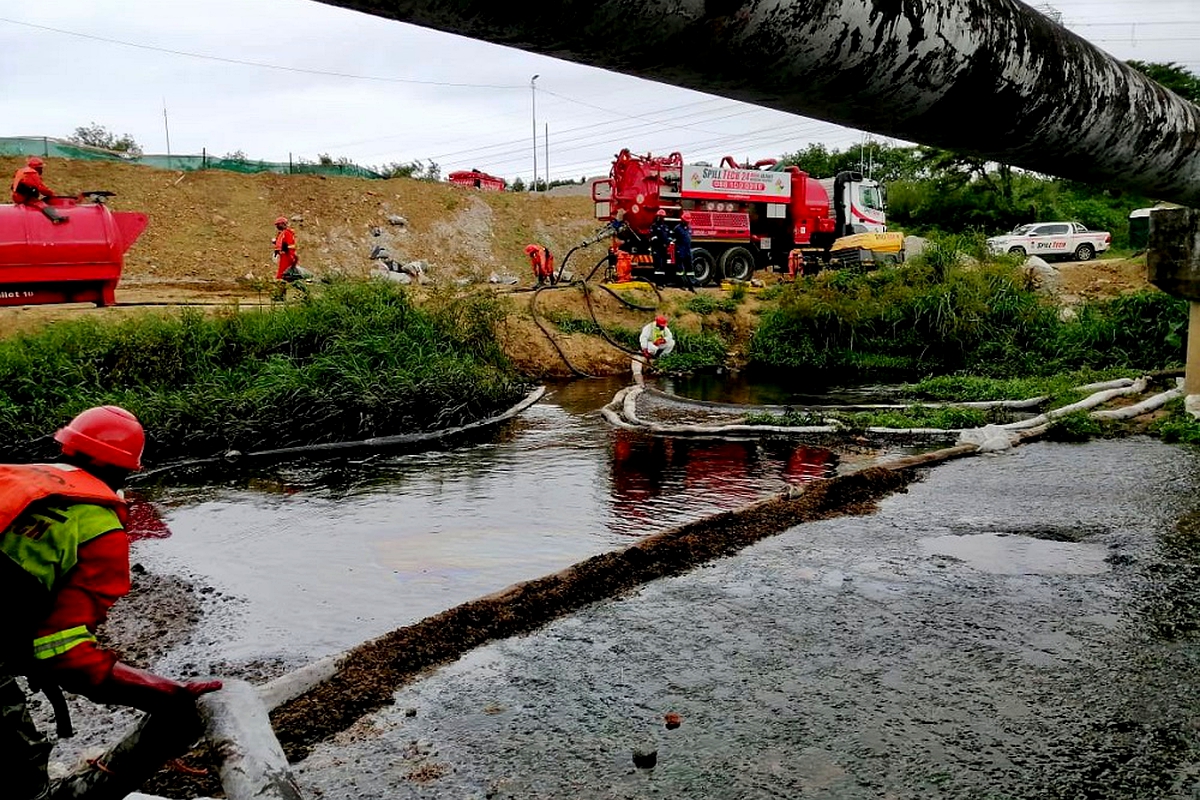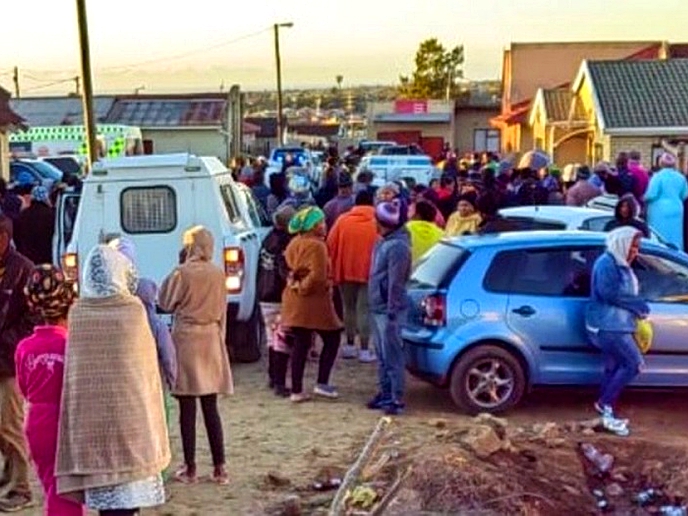WHILE fuel prices soar, South Africa loses millions of litres each year to sophisticated gangs of petrol thieves. We visit Vrede, a town at the centre of the fuel theft racket, to learn how these syndicates terrorise farmworkers and why this war will be very difficult to win.
africa
March 21, 2022
OWN CORRESPONDENT
10 min read
How armed gangs steal fuel worth millions from buried Transnet pipelines

Burst Transnet pipelines
Story highlights
The small Free State town of Vrede has become the nexus for sophisticated criminal networks stealing millions of rands worth of fuel from buried pipelines owned by Transnet. The small town has also become a target for railway track theft. As fuel prices soar, the demand for illegal petrol and diesel has increased.
Theft of fuel is one of the less publicised forms of crime in South Africa, but it is operated by armed syndicates suspected of having tentacles deep within the state security apparatus, who also engage in illegal mining and cable theft.
In April last year, Public Enterprises Minister Pravin Gordhan told Parliament that Transnet had lost 8.5 million litres of fuel valued at R102-million in the previous 2019-2020 financial year.
In the past fortnight alone, Transnet has reported three fuel theft incidents on its pipelines. In one case, on 9 March, Transnet security tactical teams were dispatched to a site in Verkykerskop, midway between Vrede and Harrismith in the Free State, after a pressure drop was detected on a pipeline.
They discovered tampering with a block valve chamber which resulted in a massive diesel spillage into the nearby Meul River. Environmental teams had to be called in to clean up the toxic mess.
According to Transnet Pipelines spokesperson Saret Knoetze, there have already been 77 incidents of fuel theft this year, involving 3.5 million litres. But, Knoetze says, that marks a major improvement: last year there had been 141 incidents by this time. She credits new security interventions by Transnet that have reduced theft by half.
The Transnet pipelines are among the largest forms of public infrastructure in the country.
Buried 2m beneath the surface, they span 3,800km across five provinces, pumping 250 million litres each week. Without the pipeline, a thousand more petrol tankers would be clogging our roads every day.
Vrede is at the midpoint of the pipeline that stretches from Durban to Gauteng.
On 4 January, police acting on a tip-off arrested foreign national Patrick Kapalamula for stealing diesel and damaging essential state infrastructure near Vrede. Four trucks with trailers and a bakkie were found at the scene.
AmaBhungane visited Vrede soon after. At the police station, we saw six impounded fuel tankers. Checking the number plates, we traced three of the trucks to a South African man whose credit record shows he worked for a Zimbabwean logistics company, but the company’s chief executive said he had no knowledge of the man and they had no fuel trucks operating in South Africa.
We visited several farms in the Vrede area that had recently experienced theft from the pipeline that runs underneath their land.
The farms are remote. But gates have been broken, making access easy for trespassers. The buried pipelines run invisibly beneath the farmlands, but at intervals, valves protrude above the surface.
These valves are the targets for tampering. On one farm, where the valves were damaged in October 2021, they had still not been fixed when amaBhungane visited in February and were readily available for further theft.
However, Knoetze said that Transnet Pipelines had since repaired the pipelines.
The local farmers and farmworkers are aware of what is going on, but there is a culture of fear and they are not willing to speak. Yet a general picture emerged during our visit of how a typical theft is staged.
Three or four tankers with no markings will peel off the highway and drive down remote farm roads, accompanied by other vehicles such as bakkies. Some sources claim that they have alerted local police to the suspicious behaviour of these convoys, but that no police arrived and this has contributed to most thefts being unreported.
One farmer in Vrede, who did not want to be identified, said there were suspicions that the criminals were working with police and Transnet officials.
“… [B]ecause how do you explain unmarked fuel tankers in this area in the middle of the night and no police picks up on it? Also, how do the thieves time the exact dates and times of when fuel will be flowing through the pipelines? Something doesn’t add up.”
He said another challenge was that it was difficult for even private security to respond because the thieves were armed.
“They have private cars monitoring everywhere and they alert each other should anyone approach,” said the farmer.
Free State Hawks spokesperson Captain Christopher Singo said that after police noticed a spike in cable and fuel theft in the province, authorities embarked on an awareness roadshow to communities.
“We educated communities on the dangers and consequences of fuel theft and told them how to report to us [the Hawks] should they see something suspicious. We noticed that some people are scared to come forward because they think their identities are going to be leaked. Also, in small towns, people know each other very well so as the Hawks we assure them of their anonymity,” he said.
Singo said that members of the SA Police Service (SAPS) were usually the first people on the scene and handed over the case to the Hawks.
According to a 2020 edition of the documentary television programme Carte Blanche, some gangs have the willing cooperation of poorly paid local farmworkers, rewarded with a few hundred rands each for their services. About 10 men are involved in each gang, heavily armed with automatic weapons. They are well trained, each is assigned a particular task, and the most senior are said to be paid up to R40,000 for a day’s work.
A farmworker told amaBhungane how three years ago he scored cash after he helped a stuck fuel tanker out of the mud.
“It was after midnight and I heard a commotion outside and I saw trucks lining up close to the Transnet valves. I saw one truck was stuck in the mud. Two guys who were in a bakkie came to me. One went to the bakkie and gave me lots of cash. When I went to the truck to speak to the driver, there was lots of cash next to him as well,” said the farmworker.
Enjoy our daily newsletter from today
Access exclusive newsletters, along with previews of new media releases.
The Transnet pipeline valves are sealed from tampering inside heavily secured block valve chambers. Special equipment is needed to break these open. The gangs’ other technique is to dig trenches alongside the pipeline, cut holes in the pipe and weld syphons into place. In one case, the holes were hidden in the floor of a farmworker’s shack.
The men seem utterly brazen, with little fear of arrest. They have inside knowledge: diesel, the fuel which seems to interest them most, is only pumped at certain times. Skilled operators can fill a tanker in a couple of hours, which means several can be filled in a night.
The biggest risk to them is fire or explosion. Three people died while attempting to steal fuel in Durban in October 2021. In January 2021, police were summoned to a huge fire on a Kendal maize farm, which they tracked to a burning pipeline. Two badly injured men were found hiding nearby, both of whom died in hospital the next day. In December 2019, a fire caused by fuel theft outside Alberton forced the temporary evacuation of 40 nearby homes.
Since the thieves have no motive to clean up after themselves, there is also considerable pollution from leaks, which can damage large expanses of crops. In October 2020 some 60,000 litres of oil leaked into the Umbilo River, flowed through several communities and a nature reserve, and reached all the way to the Durban harbour.
Knoetze said 264 cases had been reported to the SAPS over the past three years, resulting in the arrest of 155 suspects. To date, there have been two convictions with more expected. No Transnet Pipelines employees have been arrested.
What is Transnet doing about this?
Transnet, facing multiple crises across its railways and harbours infrastructure, is poorly placed to deal with the pipeline theft. The pipelines span vast distances across remote parts of the country. Operating costs have rocketed in recent years due to an “unprecedented increase” in pipeline theft and the consequent need to fix the infrastructure and clean up the environment.
Security cameras have been installed and tactical response teams equipped with drones have been deployed at the more notorious “hotspots”. Transnet claims to be working more closely with the police, resulting in an improvement.
But this is a war that is very difficult to win. When the gangs are caught on arrival, before stealing the diesel, the cases have proved too weak to win in court. The only way to prove that Transnet diesel has been stolen is to show that it is “pure”, without additives. But the thieves very quickly adulterate the fuel with additives to disguise the source. Transnet aims to catch “the kingpins”. But whenever they have found one alleged “kingpin”, it turns out that he works for another, who works for another.
The real kingpins may not live in South Africa and are a long way from being caught.
Railway and cable theft
Fuel theft is only one of Transnet’s problems in the Vrede area. While conducting site investigations relating to pipeline theft, amaBhungane was alerted to suspicious trucks carrying railway tracks around Vrede.
One farmer said his suspicions were aroused after he noticed that these trucks moved only at night. When he spoke to one of the drivers, he was shown a letter stating that Transnet Freight Rail had given permission for the removal of all obsolete, redundant and inactive railway tracks in the Wakkerstroom region in Mpumalanga. The letter was dated 3 October 2019
Alarm bells went off, the source said, since Vrede is very far from Wakkerstroom and the letter was outdated. The source called the police.
“But there was no action for a couple of weeks. So these people just intimidate private landowners to get in and load the stripped railway tracks waving this letter. It was maybe after two or three weeks we heard there was an arrest.”
A spokesperson for Transnet Freight Rail, Sibu Majozi, confirmed that 16 suspects were arrested for stripping railway infrastructure in the Free State on 23 February. She said the suspects were in possession of a fraudulent letter of authority from Transnet, “granting” them permission to remove the track infrastructure.
“Our security team arrested and handed the suspects over to SAPS. Apart from this incident, we have not seen theft of this nature in the Free State recently. The largest proportion of theft experienced by us remains cable theft,” Majozi said.
In the current financial year alone, more than 1,000km of cable have been stolen. The Cape Corridor in particular, which passes through the Free State, had experienced 406km of cable stolen for this current financial year, stated Majozi.
There is no easy solution — not until the “kingpins” are arrested. In the end, South Africa can ill afford the hefty costs in terms of lost volumes and revenue for Transnet and its customers, and in turn, the lost tax revenue. DM
Tailored for you






